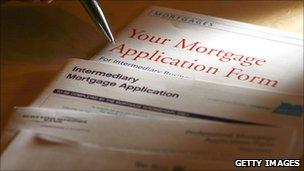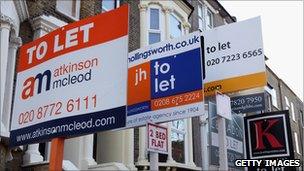Will house prices fall or rise in 2011?
- Published

Up a bit or down a bit, many observers expect little change in house prices in 2011
Expert commentators are divided about whether house prices will fall further, stabilise or even rise during the coming 12 months.
In 2010 the property market took a turn, and a brief recovery in prices that had started in 2009 ran out of steam.
The severe rationing of mortgages continued and, combined with an influx of would-be sellers, this produced a surplus of sellers over buyers.
The result was that prices started going down again.
Whatever their forecast for prices in 2011, most observers are certain that mortgage borrowing, and completed sales, will stay at their current, very low levels.
"Stable or stagnant - take your pick as to how you describe it," says Bernard Clarke of the Council of Mortgage Lenders (CML).
"The housing stock is now changing hands at the rate of once every 20 years," he points out.
Muddling through
One of the biggest factors at play is the continued dearth of mortgage funds.
Lenders continue to be ultra fussy about to whom they will lend, with only the most credit-worthy borrowers - and those with large deposits too - likely to be offered the mortgage they want.
The CML estimates that in 2011, banks and building societies will have to repay about £130bn of the emergency borrowing they took from the Bank of England and the Treasury during the height of the credit crunch.
So the rationing is going to continue, with first-time buyers still being forced to find the cash to put down deposits of between 20% and 25% of the value of the home they are buying.
"Money is not available on the same terms as it has been for the past three decades," says Simon Rubinsohn of the Royal Institution of Chartered Surveyors (Rics).
"I think prices will be down a bit then up a bit, ending the year about 2% lower than they started - a bit of a 'muddle through' economy."
Debt indigestion
As a result of this squeeze on the industry's finances, most lending is now even more concentrated than before, in the hands of just five or six big lenders.

Difficulty in obtaining a mortgage has been the biggest factor affecting sales and prices
One of those is the Nationwide building society, by far the biggest lender in a sector where most societies are just ticking over.
The Nationwide's chief economist, Martin Gahbauer, predicts that prices will decline gently for at least the first six months or so of 2011.
"There will be a recovery eventually, but cycles in housing are very long," he points out.
"Households are still very indebted, the boom was a long boom, and it is not unreasonable to expect a period of digestion to take a long time."
Rising unemployment
Two factors have stopped sales and prices falling more sharply.
One has been the Bank of England's determination to keep interest rates as low as possible, as long as possible.
And the other has been the lower than expected rise in unemployment.
The recession may be formally over, but big government spending cuts are in the pipeline, with the jobless count likely to rise significantly.
Ed Stansfield, at the leading economics consultancy Capital Economics, says this will have a big impact.
"Unemployment will start going up again, but to double digit levels, to about 10% or three million - and we think there will be private sector job cuts as well as public ones."
"Prices will continue to come down, about 10%, but there's a large amount of uncertainty.
"If they don't fall next year they will fall the year after," he predicts.
Fear and panic?
Many economists think that interest rates will stay as they are through 2011, but one of the biggest lenders, the Halifax, reckons they may in fact rise by the end of the year.

Demand from tenants pushed rents steadily higher in 2010
It is forecasting a 0.25% increase in the Bank of England's bank rate by the time 2011 is over, if the economy picks up a bit more.
Will this cause fear and panic among borrowers accustomed to the historically low rates they have enjoyed over the past 18 months or so?
The Halifax's housing economist Martin Ellis thinks not.
"If it is presented as a return to more normal interest rates I wouldn't see it as having a material effect," he says.
So Mr Ellis thinks house prices will be largely unchanged in 2011.
Stupid prices
Not so Jonathan Davis, an economist and wealth manager who has long been the Cassandra of property price forecasters.
He has persistently forecast that house prices were in for a long, steep decline, even before their bubble burst in 2007.
Mr Davis sees the unexpected rise in prices from 2009 to the middle of last year as merely a blip in an inevitable downward trend, one which he thinks will last for at least the next two to three years.
"As we no longer have easy lending that is the reason for the market to be in the doldrums for years, if not decades," he says.
Predicting a 10% price fall in 2011, and a drop of 25% to 30% in the next two to four years, he says reality can no longer be stopped from intruding on the expectations of sellers.
"Transaction levels are down because asking prices, about 25% above selling prices, are so stupid," he adds.
Buy-to-let
Ray Boulger of the mortgage broking firm John Charcol takes the opposite view.
Despite agreeing that activity will stagnate this coming year, prices, he thinks, will start rising again by the end of 2011 after drifting down in the first half.
"There are already signs that the flow of properties onto the market is declining," he says.
If that continues it should remove some of the downward pressure on prices.
But he also points to what he sees as an impending rise in the demand from buy-to-let landlords who want to buy more properties.
"Those who want to expand their portfolios are finding their access to finances easier than earlier in 2010," he says.
"They can now get loans at 80% loan-to-value whereas before the maximum mortgage they could get was just 75%."